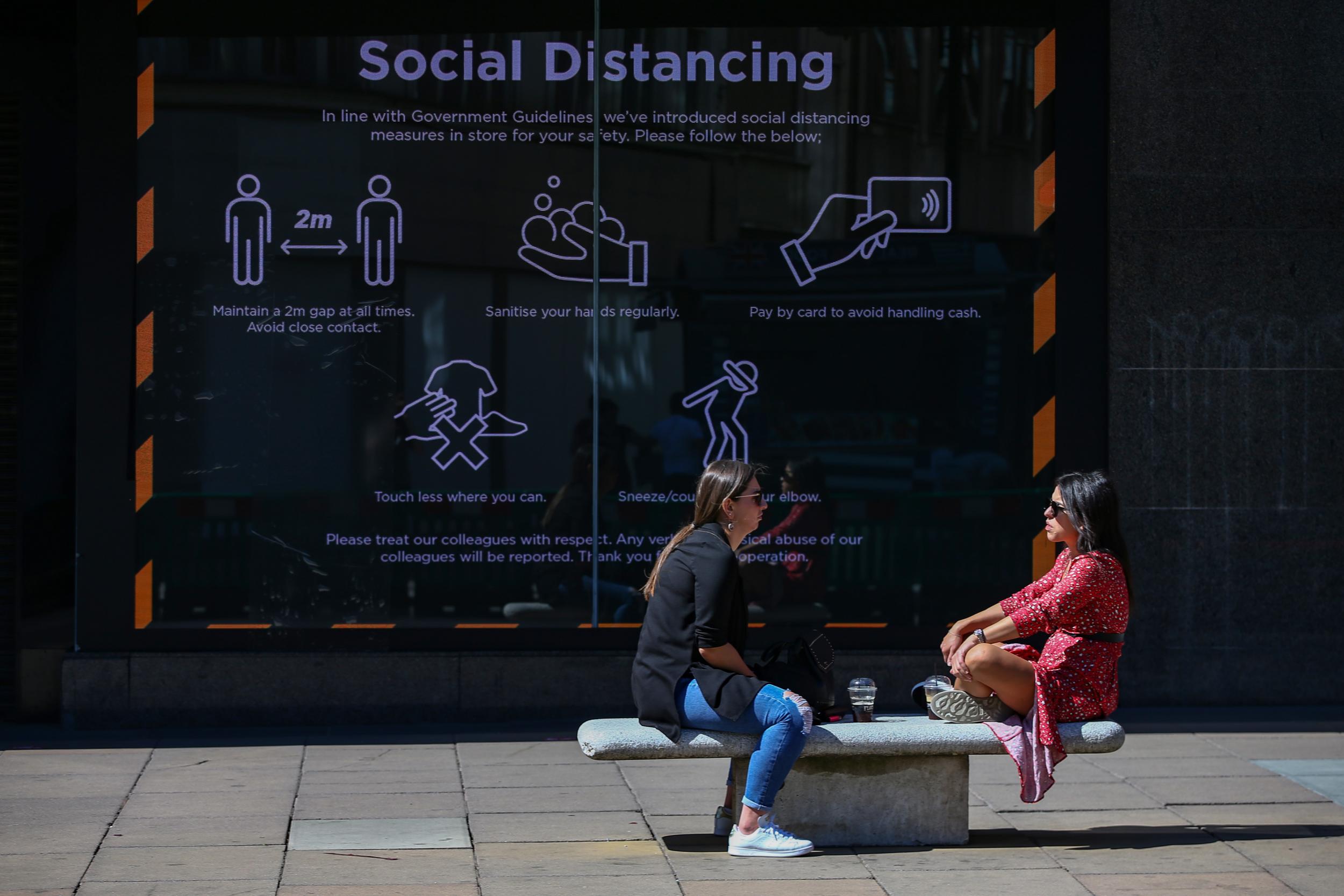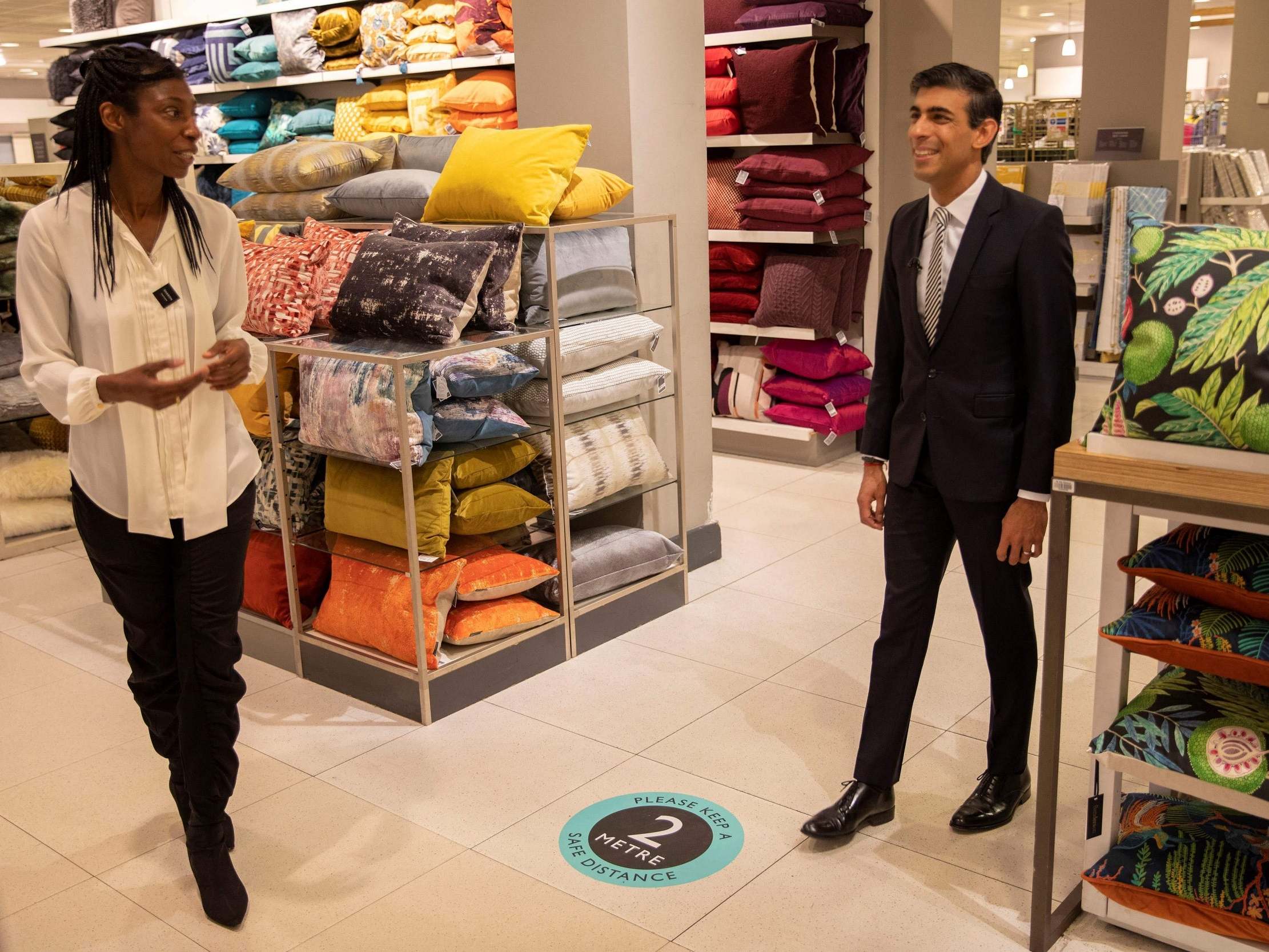Government could overrule scientific advisers to relax two-metre social distancing rule as Boris Johnson urges people to return to shops
‘Shop, and shop with confidence’ urges prime minister

The government could overrule its scientific and medical advisers to relax the two-metre coronavirus social distancing rule, the chancellor has said – as Boris Johnson urged Britons to head back to the shops.
Rishi Sunak pronounced on Sunday that “advisers advise ministers, who are elected to make decisions” after he was asked whether it would be politicians or senior experts like Sir Patrick Vallance and Chris Whitty who would have the final say on what was safe.
Senior figures within the Conservative Party and business lobby groups have been urging the government to relax the rule for fear it could make reopening their premises unprofitable, but Labour warned that the government should follow the science and ensure that workplaces are safe before people return.
It comes as a further 36 deaths from coronavirus were recorded on Sunday, taking the total to 41,698. The total is among the highest of any country in the world, but the daily toll is the UK’s lowest since lockdown began, though figures can be distorted on weekends.
“I am very optimistic about the opening up that is going to happen tomorrow,” the prime minister said ahead of today’s opening of non-essential shops for the first time since March.
“I think people should shop, and shop with confidence, but they should of course observe the rules on social distancing and do it as safely as possible.”
Speaking to broadcasters he confirmed that the two-metre rule was under review and argued that a falling death toll provided “more margin for manoeuvre” for relaxing safety regulations.
But the prime minister would face a struggle to convince the public of any change. The latest poll from YouGov found support for keeping the two-metre rule in place at 58 per cent, against a smaller 24 per cent who want the distance halved.
Senior Tory figures put further pressure on the government on Sunday over the issue. Former party leader Iain Duncan Smith, one of the loudest voices for changing the regulation, pointed to other countries with different guidelines.
“This is critical. All the evidence for this already shows that it is feasible to move to one metre; other countries have gone to one, France, in Germany it’s one and a half. Two metres, most of the scientists now agree, isn’t absolutely vitally necessary at all, because the likelihood of air-to-air transmission is very, very small indeed,” he told the BBC.
Conservative West Midlands mayor Andy Street say the current distance would make it harder for “not just hospitality” but also “the same with education, the same on public transport, everywhere it’s the same”. He said he welcomed the review announced by the government and that he hoped it would find in favour of a reduction in social distancing.
But shadow justice secretary David Lammy said the government should follow the science – a mantra ministers have in the past claimed as their own.
“I don’t think it’s binary. I think the first thing is science: what does the science say, follow the science. The second thing is be frank and honest with the public in balancing risk as you make that determination. I think the government’s been slow: slow on testing, slow on lockdown, slow on PPE, and I think they’ll be slow on this,” he told the BBC.
“They’ve said they’re having a review; I don’t know the science, I think we will want to see the science. We would support the government on relaxing the rules, of course, as long as it’s the right time to do it. None of us want to be in this state of lockdown and paralysis forever and indeed our economy at some point [needs] to open up again, all of us recognise that.”

He went on: “Many other countries around the world use a different rule and indeed, we’ve seen a couple of countries recently – I think Norway and Denmark – have moved from two metres to something less as well, but it’s important that we look at it comprehensively in the round and that’s what we will do urgently … I can very much understand the impact, the positive impact it will have on businesses’ ability to reopen and thereby maintain the jobs that they have.”
Labour has called for “clarity and guidance” for the hospitality sector ahead of reopening. Shadow business minister Lucy Powell said the government should “publish an action plan which maximises economic viability, whilst minimising the risk to the health of customers and staff”.
“If they fail to act, our communities will lose much-loved pubs, bars and restaurants, and we’ll see a wave of closures and unemployment which will damage villages, towns and cities across the country,” she said.
Shadow employment rights secretary Andy McDonald also said the government needed to “up its game” and make workplaces safer by properly resourcing safety inspectors. Funding for the Health and Safety Executive was cut by £144m in real terms since 2009-10.
“Laws to protect workers are not worth the paper they’re written on if we cannot enforce them. The government has been too slow too often in tackling the coronavirus outbreak and needs to up its game,” he said.
“Workers need to be able to trust the prime minister when he says it is safe to return to work outside the home, and have confidence that their health and their families’ health will be protected.”
Asked whether ministers or scientists would take precedence in the decision on the two-metre rule, chancellor Rishi Sunak told the BBC’s Andrew Marr Show: “I think Chris Whitty and Patrick Vallance throughout all of this have provided advice to ministers and ultimately it’s for ministers, whether it’s me, the prime minister, health secretary, and others, we are the people who are elected to make decisions in this country.
“People should hold us responsible and accountable for making those decisions, but I think people are comforted and have confidence in those decisions if they know that we are taking advice from our scientists in what is ultimately a health crisis, informed a lot by what is happening with regard to the spread of viruses.”
He added: “Whether they’re scientific or others, advisers advise ministers, who are elected to make decisions and people can hold us accountable for those, ultimately.”
The statement by Mr Sunak is a change in messaging for the government, which has consistently claimed to be “following the science” in its policy throughout the crisis. The UK has suffered one of the worst death tolls from the disease, behind only the United States and Brazil.
Some scientists have suggested delays in introducing lockdown measures by Mr Johnson’s government led to the significantly worse situation in Britain compared to other European countries, most of which are now returning to normal and reopening pubs, bars, cafes, and restaurants.
Limitations and deficiencies in the government’s test and trace regime, which was downgraded early on in the crisis while other countries built their capacity, are also thought to explain some of the differences.
The prime minister’s review of the two-metre rule is expected to be completed by 4 July, the earliest date pubs and restaurants are expected be allowed to open in England. These businesses fear being hit hardest by the change as fewer people would be able to fit in a single establishment, reducing profitability.
Speaking separately on Sky News, Mr Sunak said: “The prime minister has put in place a comprehensive review of the two-metre rule. That review will involve the scientists, economists and others so that we can look at it in the round.
“You are right to highlight the impact it has on business; I know that of course it’s the difference between three-quarters and maybe a third of pubs opening, for example, so it’s important that we look at it. Now that we have made good progress in suppressing the virus, we’re at a different stage of this epidemic than we were at the beginning and that enables us to take a fresh look at this.”
Join our commenting forum
Join thought-provoking conversations, follow other Independent readers and see their replies
Comments
Bookmark popover
Removed from bookmarks